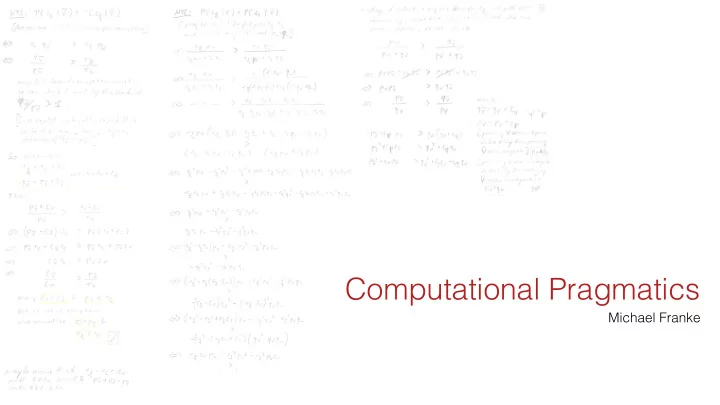

Computational Pragmatics Michael Franke
2
The biggest collection of paper clips is in Spaarnwoude, Nordholland. 3
Whiskey! 4
Two views of language disambiguated by ambiguous pragmatic reasoning structure function
logical Semantics
7
8
expression sense reference “ robot ” HAS A DETERMINES Frege Sense (Sinn) ::: intension ::: manner of presentation (Art des Gegebenseins) ::: way of singling out parts in a On Sense & Reference world to which the expression applies Reference (Bedeutung) ::: extension ::: set of positive instances in a given world / truth-value for saturated
10
(1) a. They got married and had kids. b. They had kids and got married. (2) One more ukulele song and I’m out. (3) Jon had no coin or he would have given it to him. (4) If you pour sugar in your coffee, it tastes great. But if you pour sugar and gasoline in your coffee, it tastes awful. (5) A: Do you speak Portuguese? B: My wife does. 11
Gricean Pragmatics
“If I say to any one, ‘ I saw some of your children to-day ’, he might be justified in inferring that I did not see them all, not because the words mean it, but because, if I had seen them all, it is most likely that I should have said so.” (Mill 1867)
“[O]ne of my avowed aims is to see talking as a special case or variety of purposive, indeed rational, behaviour.” (Grice 1975)
(1) a. They got married and had kids. (5) A: Do you speak Portuguese? B: My wife does. b. They had kids and got married. L assumes S obeys Maxims L assumes S obeys Maxims by Manner, L assumes S to be “orderly” by Quantity & Relevance, L assumes S to give all the relevant information S is able to L expects S to present events in chronological order (unless otherwise if S was able to speak Portuguese, S would/ indicated) should have said so 16
Q-Implicatures (6) I saw some of your children. ↳ I saw some but not all of your children. (7) I saw Jack or Jill. Levinson ↳ I don’t know which. I-Implicatures (8) Every ten minutes a man gets mugged in New York City. ↳ Not the same poor fellow every time. Horn (8) Every ten minutes a light blinks on the machine. ↳ The same light every time. M-Implicatures (9) Black Bart caused the sherif to die. ↳ In some unusual manner, perhaps by accident. Atlas 17
Grammaticalism language as a formal system embedding in compositional Chierchia, Fox, Spector, Magri Neo-Grice semantics Gazdar, Horn, Atlas, Levinson, Russell, Sauerland, Schulz, van Rooij, Spector, n o i t a n z o i t a i t a m z e i l Optimality theory t a s m y s r o f Blutner, Zeevat, Hendriks, Gricean de Hoop, Jäger, Mattausch, Aloni, Krifka ideas e v o r l e . / d c u o g c t n i o . n f o u n d a Game theory t iterated reasoning i Post-Gricean o n RSA communication interaction & Parikh, Jäger, Benz, van Rooij, Jäger, Franke, Sperber, Wilson, Carston Benz, van Rooij Rothschild, Pavan, Stevens meanwhile Theoretical Economics elsewhere Cognitive Science rational communication probabilistic (Bayesian) modeling message credibility
probabilistic Pragmatics
situation ∀ “I saw some of your children today.” ? ? situation ∃ ¬ ∀
literal interpreter rational speaker rational interpreter ∀ ∀ ∀ “all” “all” “all” ∀ ∃ ¬ ∀ “some” ∃ ¬ ∀ “some” “some” ∃ ¬ ∀
rational interpreter rational speaker literal interpreter
∀ ∃ ¬ ∀ “all” rational interpreter 1 0 “some” 0 1 “all” “some” 1 0 ∀ rational speaker 0 1 ∃ ¬ ∀ ∃ ¬ ∀ ∀ “all” literal interpreter 1 0 “some” .5 .5
∀ ∃ ¬ ∀ “all” rational interpreter .9 .1 “some” .1 .9 “all” “some” approximately .9 .1 ∀ rational speaker .1 .9 ∃ ¬ ∀ ∀ ∃ ¬ ∀ “all” literal interpreter 1 0 “some” .5 .5
listener behavior ∀ ∃ ¬ ∀ U → ∆ ( S ) “all” rational interpreter .9 .1 “some” .1 .9 “all” “some” speaker behavior approximately .9 .1 ∀ rational speaker S → ∆ ( U ) .1 .9 ∃ ¬ ∀ ∀ ∃ ¬ ∀ “all” literal interpreter 1 0 “some” .5 .5
Rational Speech Act model literal interpretation strategic depth 0 L 0 P lit ( s | m ) = P ( s ∣ [ [ m ] ]) Gricean speaker strategic depth 1 P S ( m | s ) ∝ exp ( α ( log P lit ( s | m ) − C( m ) ) ) S 1 Gricean interpretation strategic depth 2 L 1 P L ( s | m ) ∝ P ( s ) P S ( m | s )
This course applications technicalities WebPPL referential communication Bayesian Data Analysis (epistemic) scalar implicatures … non-literal language use vagueness politeness …
Reference Games
referential communication context set of objects/referents utterances U = { ”square” , ”circle” , ”green” , ”blue” } single properties of objects which object do you think a speaker meant when she selects “blue”?
RSA for reference games (example) “square” .5 0 .5 literal interpreter “circle” 0 1 0 “green” 0 0 1 “blue” .5 .5 0 “square” “circle” “green” “blue” .5 0 0 .5 rational speaker 0 .89 0 .11 .89 .11 0 0 “square” .82 0 .18 rational interpreter “circle” 0 1 0 “green” 0 0 1 “blue” .82 .18 0
Recommend
More recommend